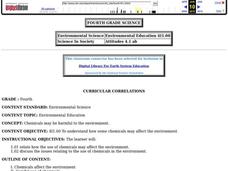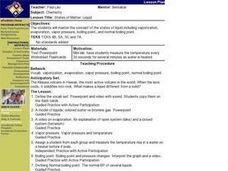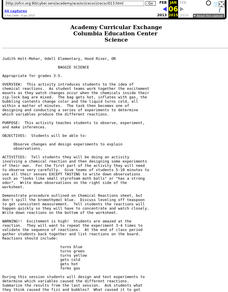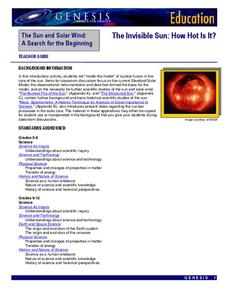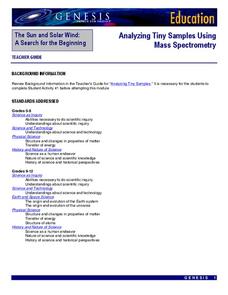Curated OER
Pieces of Mind: Remembering What Matters
Students watch the program "Pieces of Mind" from PBS and participate in a class discussion about PET scans and their advantages. Students then brainstorm activities a PET scan could be used for.
Curated OER
It's a Matter of Consent: Considering a Patient's Rights.
Learners create a Patient's Rights Charter after discussions of past experiments with such rights charters using the biographical posters in order to stimulate discussions on current attempts to create a Patient's Rights Charter. They...
Curated OER
The Great Volume Exchanger...or the Magic Matter Maker ®
Learners pour water into a "magic" box and examine how it comes out with a much larger volume of water. They, working in small groups, design a volume exchanger and explain its design to the whole class.
Curated OER
Ethics In The Science Classroom - Fraud In Science
Pupils are given a fictitious case study to read in preparation for the class. This lesson can also be readily adapted for a role-playing classroom exercise. They discuss the ethical issues of the case.
Curated OER
Environmental Science
Fourth graders examine how the use of chemicals may affect the environment and how their are many different political issues surrounding chemical usage and the environment. They research different newspapers and magazines about the issues.
Curated OER
Mass Matters
Fourth graders, in pairs, explore the relationship between a star's life and its mass. They use a concept map to illustration the three categories of stars.
Curated OER
Particulate Matter
Young scholars gather air samples using a particulate air monitoring card. They investigate the variable that influence the amount of particles that they collect.
Curated OER
States of Matter: Liquid
Students work in a mini lab where they measure the temperature every 30 seconds for several minutes as water is heated. They are asked what makes liquid different from a solid. Students view a PowerPoint on the model of liquids,...
Curated OER
A Matter of State
Middle schoolers explain that particle movement changes as a substance changes from one phase to another phase.
Curated OER
Baggie Science
Students work in groups and observe chemical reactions inside zip-lock bags. They use all of their senses, except taste, to observe the reactions.
Cornell University
Bacteria Take Over and Down
Bacteria outnumber all other forms of life on Earth. Scholars observe the growth of bacteria in petri dishes to understand their role in maintaining good health. Then, they observe the growth of bacteria after they introduce...
University of Minnesota
Sheep Brain Dissection
Bored with frog and earthworm dissections? Had your fill of fetal pigs? Anatomy students will be intrigued by the sheep's brain, and you will be prepared with guiding questions, extension activities, and pictures as they dissect one —...
Cornell University
Density
Certain things just do not mix, including liquids of varying densities. Learners collect data to determine the densities of several liquids. They then use the density information to predict the type of liquid.
University of Colorado
The Moons of Jupiter
Middle schoolers analyze given data on density and diameter of objects in space by graphing the data and then discussing their findings. This ninth installment of a 22-part series emphasizes the Galilean moons as compared to other objects.
Curated OER
Wipe Out
Learners examine the flow of water. They observe and test the properties of water by using sticks in flowing water. The lesson has streaming video, resource links to access, and a good hands-on activity that is clearly described in the...
Cornell University
Sound Waves
How does sound travel through different mediums? Scholars explore this question by creating and observing sound waves as they learn the difference between transverse and longitudinal wave motion. Using their new knowledge, class members...
NASA
Photons in the Radiative Zone: Which Way Is Out? An A-Maz-ing Model
Can you move like a photon? Young scholars use a maze to reproduce the straight line motion of a photon. The second in a six-part series of lessons on the sun has learners measure angle of incidence and refraction to determine the path...
NASA
The Invisible Sun: How Hot Is It?
It's getting hot in here! The first in a series of six lessons has learners model nuclear fusion with a simple lab investigation. Groups collect data and analyze results, comparing their models to the actual process along the way.
NASA
Analyzing Tiny Samples Using a Search for the Beginning Mass Spectrometry
Teach the basics of mass spectrometry with a hands-on lesson. The fourth in a series of six lessons explores how mass spectrometry measures the ionic composition of an element. Learners then compare and contrast relative abundance and...
University of Colorado
Terra Bagga
Earth's magnetic poles switch positions about every 200,000—300,000 years. In the activity, groups create a planet with a magnetic field. Once made, they use a magnetometer to determine the orientation of the planet's magnetic field....
University of Colorado
Can Photosynthesis Occur at Saturn?
In the 19th activity of 22, learners determine if distance from a light source affects photosynthesis. Participants capture oxygen in straws and find that the amount of water the gas displaces is proportional to the rate of photosynthesis.
Santa Monica College
The Density of Liquids and Solids
There are underwater rivers that flow on the ocean floor thanks to a difference in density. Scholars learn about the density in both liquids and solids in the second lesson of an 11-part series. They then determine the density of water,...
LABScI
Freezing Point Depression: Why Don’t Oceans Freeze?
Can you go ice fishing in the ocean? Learners examine the freezing point of different saltwater solutions. Each solution has a different concentration of salt. By comparing the freezing points graphically, they make conclusions about...
Other popular searches
- Physical Science Matter
- Grade 2 Science Matter
- 2nd Grade Science Matter
- Science Matter Unit
- Physical Science Matter
- Webquest Science Matter
- Earth Science Matter
- Physcial Science Matter
- Science Matter Lesson Plans
- Science Matter Experiments
- Matter Science
- Science Matter and Nutrition






